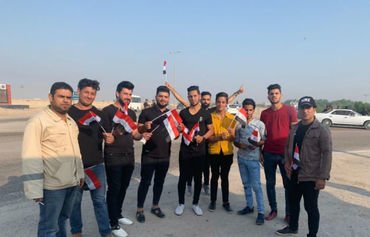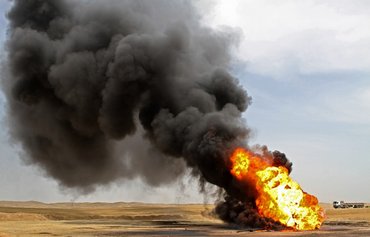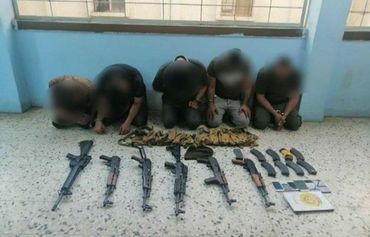BASRA -- In Iraq's southern province of Basra, the oil flows freely but little of the wealth trickles down to the people, and many struggle to make ends meet.
Sajad, 17, who lives in Basra city, says he "has no future" and no present. Like other young people, he says he just survives, a living emblem of the city's maladies.
Basra province produces about 70% of crude oil in Iraq, itself the second biggest exporter in the Middle East after Saudi Arabia.
Yet the province is hit especially hard by many of the problems plaguing Iraq, which is still seeking to recover from years of war and turmoil.
Unemployment in Basra affects 20 to 25% of the population and almost 30% of youth, estimated Iraqi economist Barik Schuber in the absence of official figures.
This compares to a national rate of 13.7%, according to World Bank figures.
From patchy supplies of water and electricity, to pockmarked roads and toxic pollution caused by extracting hydrocarbons, Basra province and its four million inhabitants are struggling.
'People are angry'
But what hits hardest is the despair of the young.
Gathered around their shisha pipes, Sajad and Jawad, both aged 16, are hard pressed to find reason for optimism.
Sajad does not work, while Jawad said he toils for "eight to 13 hours in a restaurant for 7,000 IQD (about $4.80) per day".
"I don't see a future here; I want to go to Baghdad," said Sajad, sitting on the shores of the Shatt al-Arab waterway, where the Tigris and Euphrates rivers meet.
Some investments have been made, such as a new stadium under construction ahead of the Gulf Cup football tournament due to be held in Basra in January 2023.
But "the people are angry," conceded the deputy governor of Basra, Dorgham al-Ajwadi.
He blamed the distant government in Baghdad for the inequitable distribution of the federal budget.
"In 2021, the Iraqi budget is about 130 trillion IQD ($89 billion), but for Basra it's less than one trillion," he told AFP.
"It is maybe 0.7% of the total budget, while more than 108 trillion come from Basra."
Iranian influence
For Basra resident Mortada, 27, it's not Baghdad that's to blame but rather the local authorities.
Before the pandemic, he ran an unregistered ice cream shop, he explained.
"Then the authorities shut down the illegal businesses, including mine," he said, requesting that his surname not be published to avoid problems "with certain people".
In Iraq's October 10 parliamentary elections, he voted for an independent candidate unaffiliated with the major parties because "I believe he can change things".
The elections marked a resounding defeat for pro-Iranian militias.
For many, the grievances run deeper.
Basra was a hotbed of massive protests in mid-2018, a precursor to the near-nationwide protests that rocked the country from October 2019.
Anger erupted in Basra over corruption, poor public services and, above all, the influence of neighbouring Iran, whose local consulate was set ablaze.
Tehran has long exercised influence over Iraq through certain political parties, as well as factions of the Popular Mobilisation Forces (PMF).
In Basra, some accuse "groups loyal to Tehran" of wielding harmful influence and of infiltrating the economic fabric.
One such critic refused to give his name, saying that "if it is published, I risk being killed".
Basra residents who spoke with Diyaruna in 2019 said they believed the province's oil was being looted by Iran-backed militias, with the proceeds going to fund Iran's Islamic Revolutionary Guard Corps (IRGC).
Meanwhile, rocket attacks blamed on these militias have also impacted international energy companies, including US oil company Halliburton and Italian oil company ENI, whose shared site in Basra was attacked with five rockets on April 6, 2020.
Jobs through nepotism
Three years after the Basra demonstrations, little has changed, according to Mortada, who does odd jobs and dreams of working "for the state".
In the southern province, more than in any other part of the country, a job in the petroleum sector is seen as the ultimate prize for its promise of stability and prosperity.
But according to Mac Skeleton, executive director of the Institute of Regional and International Studies based in Iraq's Kurdish region, jobs in Basra's petrol industry are handed out through nepotism.
"Each of the major Shia majority parties are competing over the Basra oil company; they're competing over the security contracts in the oil fields, for different assets," he explained.
But "connections" are necessary for a way in, he said, adding, "At the end of the day there is a kind of limit to how many people can benefit from these different spheres of power."
Some Iraqis miss out despite having connections, said Sajad, whose uncle works at the Oil Ministry.
The young man complained that his elder relative had already "accommodated two people from his family" and therefore "cannot hire me".

![A man sits across flare stacks burning off excess gas at the Nahr Bin Omar oilfield in Basra province, Iraq, on October 25. Basra produces about 70% of the country's crude oil, yet the province is hit especially hard by many of the problems plaguing Iraq. [Hussein Faleh/AFP]](/cnmi_di/images/2021/11/12/32594-iraq-basra-oil-600_384.jpg)






